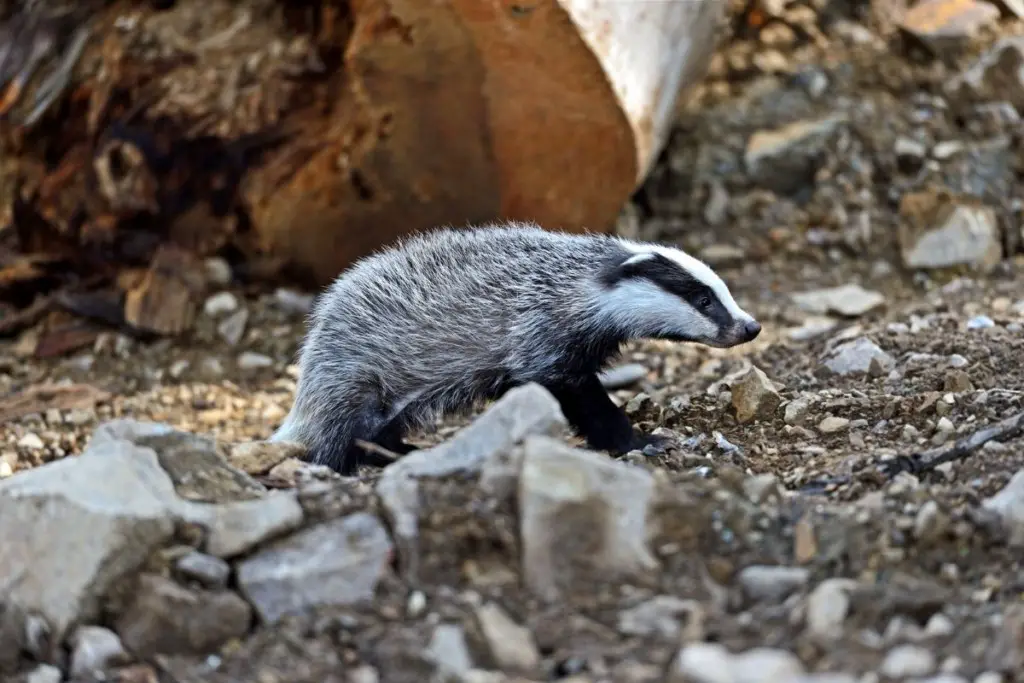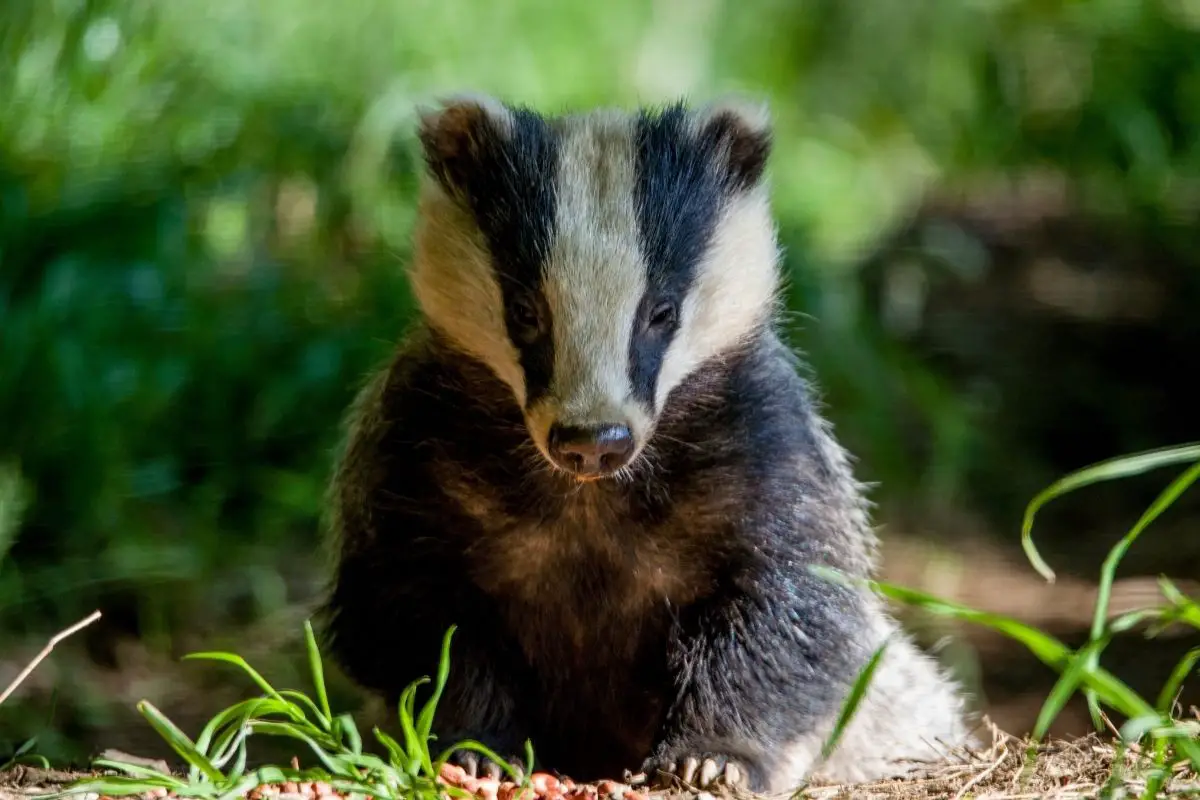Badgers are commonly recognized for their general looks out in the wilderness. They have a unique collection of characteristics that make them a very unique animal to observe in the wild.
With an average weight of only around 20 pounds, it might be harder than you think to actually find one out in the wilderness. They are about 30 inches in length and have a tail that may lengthen an additional 5 inches on average.
With a black and white striped face and dark grey coat covering the rest of their body, it seems unlikely that you’d mistake badgers for any other animal in the wilderness. They have short and stalky legs and sharp teeth that allow them to capture prey. There is a white stripe from their nose to the back of their necks.
Badgers rely on their instincts to effectively survive in the wild. They are equipped with sharp claws that allow them to dig and hunt their preferred or available diet. They can be found in various grassland environments across North America.
Is it Rare to See a Badger?
Badgers tend to be solitary animals. They keep to themselves, they hunt in places where there is little to no human activity, and they try to avoid predators by blending into their surroundings. You are more likely to see a badger crossing the road, or dead in the road.
However, with populations on the rise in places like the UK, badgers have also been coming closer to human activity and can be spotted in the wild if you know what you are looking for. These guys are pretty small, so you have to keep an eye out for them to be lucky enough to see one. Source.
What Colors Are A Badger’s Head?
The region of a badger’s body that stands out the most is its head. You will notice the familiar black and white striped pattern that looks similar to a skunk. Badger’s have this pattern on the heads of their body until the rest of their fur is converted to a dark brown or dark gray.
The black stripe patterns on their face make them easy to identify, however, there is also a white stripe that starts at the tip of their nose, that goes all the way to the back of their neck and shoulders. Every time I’ve seen a badger, its head popped up and I knew right away what it was.
Badger Measurements
As we continue to take a look at the physical traits of a badger, we are learning of the various threats that an average badger is capable of presenting. Let’s take a moment to learn a little bit more about a badger’s average size.
Male badgers can be about 30 inches long in size, while females are slightly smaller on average. Badgers commonly weigh between 15 pounds and 20 pounds but can exceed that weight if they have a healthy diet.
One of the really interesting things about badgers is that they can be quite a bit tougher than they look. Their reduced size might make them appear less intimidating, but this means that they can still put up quite a fight when the time comes. In most cases though, badgers want no confrontation and it remains likely that they will do everything in their power to avoid engaging with a potential conflict.
See our article for Are Badgers Dangerous
Can Badgers Change Color?
It is not believed that badgers can change color on-demand like other animals in the wilderness. They are primarily brownish and grayish with heads that have a black and white pattern that is highly noticeable.
They have a dense coat on the lower parts of their body and they can appear to be a darker color. Badgers can certainly adapt to seasonal weather conditions but this doesn’t necessarily mean that they can change colors. Some badgers use their color to their advantage and many of them are capable of hiding in their environment to stay away from potential nearby predators.
What Do Badgers Look Like | Eyes
A majority of badgers have dark-tinted eyes with pupils that are dark black. In some rare cases, badgers can have alternate color eyes, but this is extremely rare. Badgers don’t necessarily have vibrant eye color and badger cubs don’t even open their eyes until around their sixth week.
Because their eyes are so dark, they appear to be black from a distance. This can sometimes cause alarm when a striped face with little black eyes pops up. No need for alarm though, badgers do not really attack humans.

What Color Is A Badger Nose?
Badgers have a dark black nose with few physical appearance traits. They rely heavily on their sense of smell but there’s nothing too special about the way that their nose appears to humans.
Their noses are large in comparison with their overall body size. They look similar to a dog’s nose. Because they rely on scents from their nose, you may see them with their nose in an upwards position.
What Color Is A Badger’s Tail?
A large number of badgers out in the wilderness have a dark gray or black tail. The tail is about 5 inches in length and usually doesn’t have any patterns on it that would differ from their lower body. In addition to having a dark tail, badgers are also known for having dark claws as well.
Their tail color depends on the color of their body. Their body colors vary from being almost black, salt and pepper, light gray, cinnamon, rust-colored, to almost white.
When Do Badgers Come Out?
Badgers are nocturnal, so they mostly come out at night. This is one of the reasons it is so hard to catch a glimpse of a badger in the wild. They prefer to hunt at night, and they keep to their small home range. Badgers also socialize and play during these late hours.
A badger’s den is called a sett, the badger tends to leave its sett at different times of the evening or night. If you are really wanting to catch a glimpse of a badger it would probably be during the twilight hours.
Final Thoughts
There are a lot of different things to remember when trying to analyze the appearance of a badger. Their size, colors, and other appearance traits can provide important clues to you if you are trying to observe badgers out in the wilderness.
Not all badgers look exactly the same, but most of them can be identified based on their head colors and general appearance. Most badgers also fall into the same sizing categories, which can help for identification purposes.
It may be easy to answer the question, what does a badger look like, however, their physical appearance can help identify their age as well as the type of region that they might currently be living in. Badgers can currently be found in most regions of North America, including the West Coast and primarily in the ‘Great Plains’ region as well.
- Hero Farm Dog Survives Epic Battle with Coyote Pack - December 9, 2024
- The 10-Minute Bedtime Routine That Changed My Dog’s Sleep Forever - November 29, 2024
- Creating a Safe Space for Nervous Pets: Your Guide to Pet-Friendly Havens - November 25, 2024

